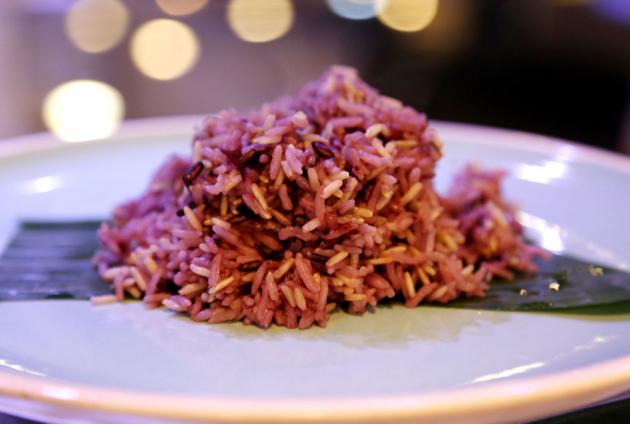Designer grains

Grassroots start-up brand Imm offers healthy blends of organic rice
THE FAILURE OF the previous government’s rice-pledging scheme not only landed thousands of rice farmers in debt but also saw Thailand lose its long-coveted position as the leading exporter of rice.
On the brighter side, it also led to the creation of several small-scale schemes under which health-conscious members of the public financed the farming of top-quality organic rice through a direct-purchase arrangement that was beneficial to both parties.
While the country has now regained its position as No 1 exporter, last year earning Bt170 billion from the sale of 10 million tonnes, organic rice continues to make its presence felt, particularly on the local market.
And now there’s more than simply organic. New kid on the block, Imm rice, is inviting consumers to enjoy a mix of grains that are blended together in much the same way as wine varietals or coffee.
The brainchild of former finance minister Korn Chatikavanij and White Cafe owner Benya Nandakuang, Imm is now offering its second crop of rice grown without pesticides in a pack that mixes jasmine rice 105, red jasmine rice, hom-min rice, and sunflower seeds from the Bang Rakam district of Pitsanuloke province.
The first Imm rice was produced by a farming cooperative in Maha Sarakham Koah Koh village last year and was an instant success with consumers.
Rice, Korn says, will continue to gain in importance in the future, as the global population increases and more tummies need to be filled. While Thailand’s neighbours might well opt for genetically modified plantations to meet demand, he dreams of seeing organic Thai rice becoming a leader in the premium market.
His Imm rice, produced under the Kaset Khemkhaeng (Happy Farmers) project, is priced at Bt120 per kilogram and comes packed in an attractive bag made from pha-kao-ma.
“The concept is for consumer to have fun and enjoy the flavour of rice,” Benya explains. “Thai people eat rice with various types of dishes but they forget that rice in itself has a delicious taste. They don’t mix it. I’d like to promote the idea that everybody can have fun mixing different types of rice for cooking. They can create their own recipes. If brown rice is too hard for them, they can introduce more polished rice. If they want more vitamins, then they can add more brown rice. They can even make the texture crunchier by adding in other grains.”
“In Bang Rakum, the farmers also produce sunflower seeds, so I mixed them in with 60-per-cent jasmine rice, 30-per-cent brown rice, and seven-per-cent red jasmine rice to give the grains a different flavour. You can blend it in your pot just like you would with coffee. Make it special!” she says.
Korn knows that there is plenty of hard work ahead if he is to realise his dreams. “The Thai agricultural sector is lagging behind in just about every aspect. It has hardly any development and everything is inefficient – the machinery, soil and water technology, even the labour. The output per rai is very low and the farmers, about four million of them, remain the poorest group in the country,” he laments.
“So when I met farmers who wanted to switch to chemical-free planting, I jumped at the opportunity. I wanted to invest in empowering and increasing the economic well being of Thai farmers in a sustainable way. I want to see everyone from Thai Airways to street vendors offer bigger and healthier choices rice.
“Today the average age of the Thai farmer is 51. Twenty-five years ago, it was 31. That means that our farmers are the same people and no youngsters are coming in. So what will happen in the next 10 years when these farmers reach 60 and retire? Who will do the farming? In Japan, a new generation of well-educated young people has come back to rice farming. Why? Because the price of rice is higher, the grains are of good quality, and they have new technology and innovations to help them grow the rice. To me this is the direction that we should be promoting,” Korn says.
“In Israel, they have a ‘dropping water system’ for farming, which can save energy and labour, and increase productivity. Unless we improve in terms of innovation and machinery and support new farming techniques, we won’t have a new generation of farmers. The traditional way cannot continue.”
Korn has adopted the same distribution channel for Imm as other direct-buy schemes, a system that has proved its salt for both buyers and farmers. Among those already trading organic rice on Facebook and online are Khon Kin Khao Chuay Khon Plook Khao, Pook Pinto Kao and Panisa Choosangsri’s Na Namjai group.
Panisa, who contracts organic rice grown by individual farmers in Uttaradit and Pichit provinces, has about 20 members in her group. “We take advantage of eating good quality organic rice and we also feel good about helping farmers enjoy fair trade practices. Organic rice has a very high potential in the market but government must help to support standardisation for international recognition,” she says.
On the Web:
www.KasetKhemkhaeng.com
Facebook.com/khonkinkhao
www.FarmerAndFriend.org
www.Facebook.com/fieldofcare
www.Facebook.com/pookpintokao





